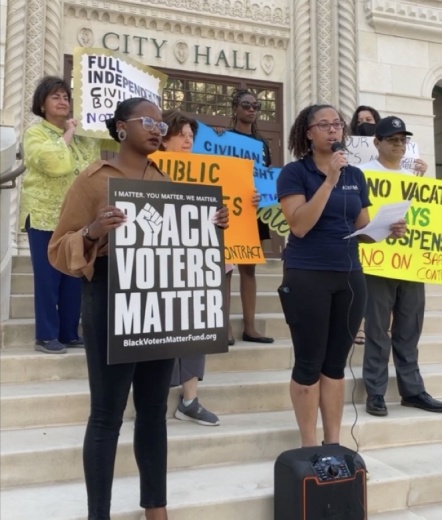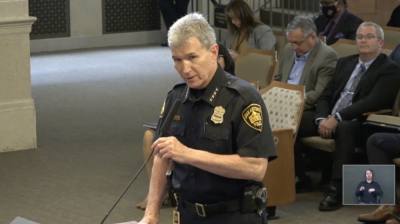San Antonio City Council on May 12 approved a five-year collective bargaining agreement with the San Antonio Police Officers Association by an 8-3 vote.
Some city leaders said the new pact with the local police union reinforces the municipal government’s full support for law enforcement and ensures that officers are held accountable for misconduct.
But other city leaders said the new CBA does not go far enough toward comprehensive, enforceable reform within the police department or upgrading police-community relations.
Mayor Ron Nirenberg said the CBA’s approval from the council and what he called “overwhelming support” from rank-and-file officers reflects a new era of cooperation between the city and SAPOA, which have been at odds with one another in recent years. About 86% of SAPOA membership backed the new pact, the city said.
“I commend City Manager Erik Walsh, Deputy City Manager Maria Villagomez, City Attorney Andy Segovia, First Assistant City Attorney Liz Provencio and SAPOA President Danny Diaz and his team for the smooth, professional negotiations leading to this agreement. I also want to thank community members who helped shape our initial negotiation goals,” Nirenberg said in a statement.
Diaz issued a statement thanking city officials and SAPOA’s negotiating team.
“We are pleased to have reached an agreement that is beneficial to the city, our citizens and our members of the San Antonio Police Officers Association,” Diaz said.
District 1 Council Member Mario Bravo—one of three councilors who voted “no” on the new CBA—said the contract fails to fully meet the commitments he pledged to address toward approving a new police union pact with the city.
“The District 1 office received countless emails and phone calls asking us to not support this contract, and out of 123,169 residents who we represent, not one sent a letter, email, or made a phone call to our office asking us to support this contract,” Bravo said in a statement.
Contact benefits for police officers
According to a news release, the new five-year agreement keeps public safety spending below 66% of the city’s annual general fund budget. The contract, valued at $92.7 million over five years, requires officers to receive a 15% recurring wage hike over five years and a one-time lump sum payment of 2% within 30 days of contract approval.
Additionally, the new pact increases residency points for cadet applicants from San Antonio, raises training hours and provides officers with an option to contribute to a deferred compensation account instead of taking a lump sum payout prior to separation, the release said.
The new pact also establishes a new family leave benefit, providing officers with up to 160 hours of paid family leave after the birth, adoption or foster of a child.
City officials said the new pact better enables the police chief to discipline officers who have violated department policies and to still provide due process for the accused officer.
The new CBA also limits an arbitrator’s power to change the level of discipline. Compared with the last CBA, an arbitrator is no longer able to overturn the police chief’s decision to fire an officer unless the chief fails to prove that misconduct is detrimental to the police department or does not meet community expectations.
The new agreement allows an officer’s past discipline to be introduced when disciplining an officer. It also lengthens the time an officer can be disciplined for non-criminal misconduct from 180 days from the date of the incident to 180 days from when the chief knew or should have known about the incident. The chief must issue discipline within two years of the date of the incident, according to the new pact.
Walsh agreed with Nirenberg that the new police union pact compensates San Antonio police officers for their work, and improves the disciplinary process and ensures it falls in line with community expects.
“I am certainly appreciative of our officers’ work in our community every day. I want to thank the San Antonio Police Officers Association for working with the city to arrive at a contract that benefits both our officers and our residents,” Walsh said.
Council members who backed the new CBA echoed comments made by Nirenberg and Walsh.
“We have heard our neighbors loud and clear that they want a police contract that addresses flaws in the disciplinary process, that results in better trained officers, that brings competitive pay to help us recruit and retain excellent law enforcement officers, and that ensures our public safety spending is fiscally responsible. This contract delivers on those demands,” District 8 Council Member Manny Pelaez said.
District 10 Council Member Clayton Perry said the contract addresses concerns about fair compensation and benefits as well as disciplinary procedures and processes.
“Both city staff and SAPOA negotiated in good faith, and I hope this trend continues as City Council and the police and fire unions have these negotiations in the future,” Perry added.
Pact draws opposition
District 3 Council Member Phyllis Viagran chided colleagues who opposed the new pact, claiming they wanted to “defund the police”—a line that drew admonishment from some fellow council members and police reform activists attending the council meeting.
Bravo, District 2 Council Member Jalen McKee-Rodriguez and District 5’s Teri Castillo all voted against the CBA, offering their continuing concerns about various issues in the contract.
Bravo said his council staff recently met with a District 1 constituent who had a bullet go through her house. But the resident hesitated calling police, Bravo said, fearing how she or her neighbors might be treated.
“What we were seeking to do today is not just create a contract with our police employees, but also improve the relationship between law enforcement and the rest of our community,” Bravo said.
“We want to recognize that this contract moves in that direction, but it falls short of where we need to be to repair broken relationships and build the trust that our community needs so that everyone feels safe,” he added.
Castillo said, during contract talks, her council office sought the elimination of provisions revealing the names of accusers to police charged with wrongdoing.
“Additionally, officers should not have the ability to use their paid holidays when they are placed on administrative leave for misconduct or wrongdoing,” Castillo said.
Castillo also said the city must improve the Complaint and Administrative Review Board by adding more seats for better community representation, and boost the panel’s investigative power. “Denver’s Office of the Independent Monitor is a great example of true civilian oversight and is something we should work toward in San Antonio,” Castillo said.
McKee-Rodriguez said the contract talks failed to address key elements, such as officers’ ability to use vacation days or discretionary days in place of unpaid suspensions. He also lamented a lack of independence for the CARB panel. Additionally, McKee-Rodriguez said he was uncomfortable with an absence of metrics for pay increases and bonuses included in the new pact.
"SAPOA carries influence with some council members on the dais. Yet, there are other voices who carry the stories, the heartbreak and the wisdom that comes from a lived experience of over-policing and fatal interactions with law enforcement. People across the country have faced violence and harm caused by interactions with law enforcement,” McKee-Rodriguez said.
McKee-Rodriguez also voiced worry about the contract containing an eight-year evergreen clause, which maintains all original requirements in the existing contract, past the expiration date until a new agreement is reached.
The news release said, during the evergreen clause, there will no base pay hikes for union members, while they will continue to see contractually agreed upon increases to health care premiums of 10% annually.
Additionally, the contract rescinds a clause that would have obligated the city to give police officers the same pay hikes as firefighters, should their contract include higher pay.
SAPOA also agreed to forgo funds from the city’s American Rescue Plan Act employee compensation. Under the new contract, officers will continue to contribute to the cost of health care. The new pact takes effect immediately and will expire Sept. 30, 2026.






